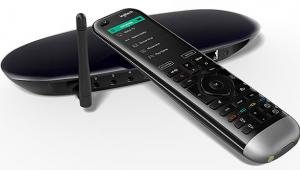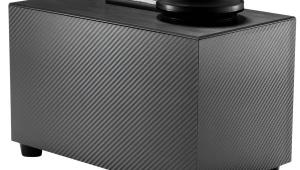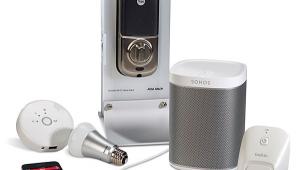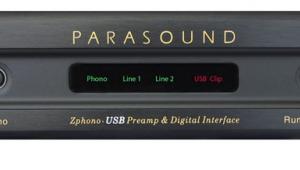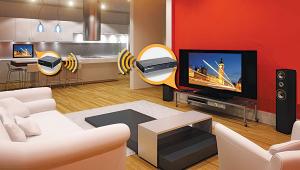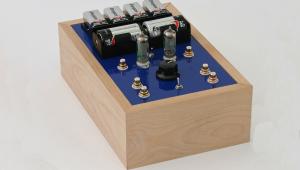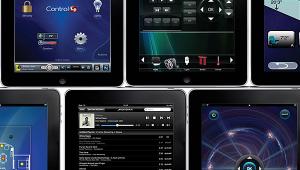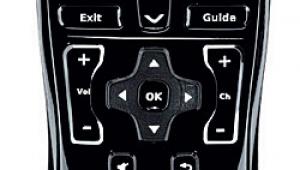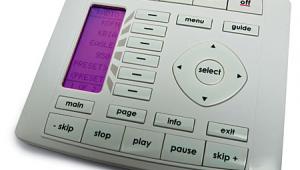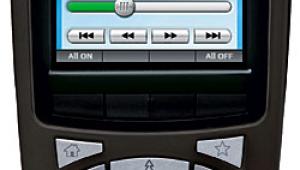APC S15 Battery Backup Power Conditioner Page 2
I did experience two minor problems. I had the S15 set to revert to battery backup if the voltage dropped to 98V. It switched over, however when the front panel read 103V. During one of those extended low voltage conditions I stepped out of the house for a couple of hours. When I came back, the system had switched over to battery power, and then drained the battery!
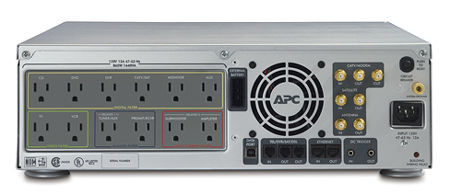
Nothing out of the ordinary there. The APC was simply doing its job, as I had set it up. And with a single internal battery, the S15's "Fuel" supply is limited. If you do want more run time, you'll just have to add one or more of those optional, outboard SBATTs.
The only additional hiccup I experienced, if you can call it that, was a slightly high voltage when the powerline rose to something resembling normal. At one point, I noticed 109V from the wall, and 124V from the S15. And as I write this, however, with the system drawing 405W (powering a big Denon AVR-5805 receiver and a Kaleidescape System server, both idling), the line voltage is 115V and the output of the S15 is 122V. If I put the receiver in Standby, the power draw drops to 162W and the voltage to 115V.
When Michael Schenck of APC spend a day at my studio setting up and explaining the S15, we spent a lot of time watching and listening to the system. During his visit, and particularly during the late afternoon and early evening peak power period, the voltage must have been low (I didn't make a not of it at the time) because the system switched frequently to battery power. But we were straining the system to the limit, including the crash scene from the remake of Flight of the Phoenix played back at high level. Each time, however, the switch to the battery only lasted for an instant—which is all it will be required to do most of the time. After Michael left, I reduced the system sensitivity slightly to minimize the switching (which produced an audible relay click, but never any perceptible interruption to either the audio or the video).
I later had an even more interesting experience during the great power failure of 2005. OK, so New Yorkers can lord it all over Angelinos when it comes to power failures. Ours lasted about 90 minutes at midday, and no one had to hike over the river and through the woods to get home. But it was a genuine outage that affected much of the city, caused by some dodo in the metro power system who apparently left "be careful not" out of a work order that read "cut the power line."
I was home when it happened; the system was turned on but not in use. I first noticed that my computer and desk lamp went out in the office where I was slaving over the keyboard on some review or other. When I went into the home theater room to check it out, my first reaction was that I must have tripped a circuit breaker in the house, because the power on that circuit was still on! Doh. I soon remembered the S15, now on battery power, was supplying the whole system. I turned everything off as a precaution against a turn-on spike. The S15's surge protection likely would have protected the system from that had I been out, but it's always wise to take additional precautions whenever you can. After the power in the house returned, I switched the S15, and the system, back on. Everything powered-up without a hitch.
Speaking of thunderstorms, we even had one of those a couple of weeks ago. Thunderstorms are extremely rare in LA, so now I'm certain that APC has friends in high places. In any event, I didn't shut anything down this time, but I experienced no problems. There were no later reports of lightening actually damaging anything in the area, but the presence of the S15 was reassuring while the storm was underway. I'd still recommend shutting things down during such storms, however, if you're home to do it.
All that Jazz
At this point, you probably want to hear that audiophile tune about how the APC cleared away the cobwebs and dramatically improved the sound of my system by blackening the (audio) black background, lightening the chocolaty midrange, and polishing up the highs. Or the less common videophile equivalent of blackening the (video) blacks, whitening the (video) whites, and polishing up the (video) resolution.
No such luck. The APC made no obvious change, either for the better or the worse, in the overall performance of my system. That doesn't mean that it won't improve yours—there are simply too many variables involved, from the power coming from your local electrical supplier to the components in your system and how well they handle less-than-pristine power without a conditioner. It also depends on your expectations. I'm not immune to audiophile nervosa; yes, I do hear differences in cables, amplifiers, and even the sound of CD and DVD players from their digital outputs (including variations in the sound of digital cables themselves)—differences that the meter-reading enthusiasts insist can't possibly exist.
But I can't recall any instance in which a power conditioner has actually lifted any veils from my system—either audio or video. Perhaps I've just been very lucky in where I've lived and the equipment I've used. Your experience may be different. But to APC's credit, and unlike many other companies that sell conditioners to the notoriously fickle audiophile market (where it all began—videophiles tend to be a little more skeptical about hard-to-quantify improvements), they make only the slightest reference to possible audio and video improvements from the reduction of noise in the powerline. Their main business is filtering, protecting, maintaining, and sustaining your power. In my experience, they do that very well, without charging an arm and a leg for the privilege. That's plenty good enough for me.
Highs and Lows
Highs
• First rate power conditioning and control
• Reasonable cost
• No techno-babble
Lows
• Front panel cosmetics a bit overdone and flashy

